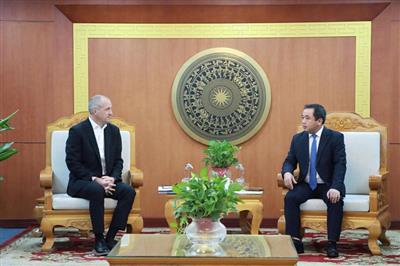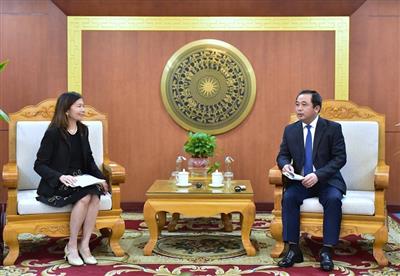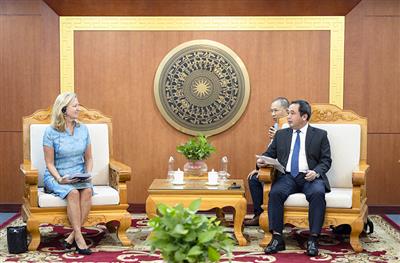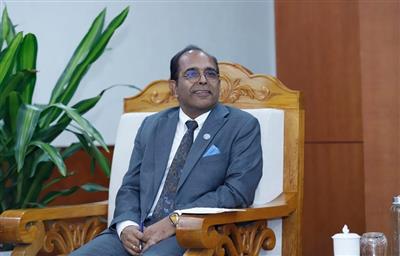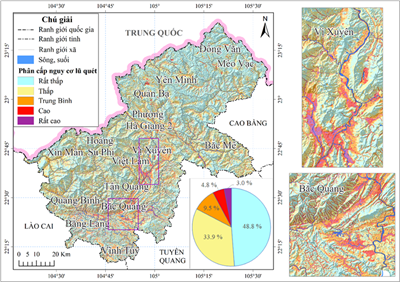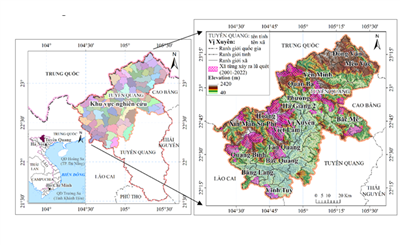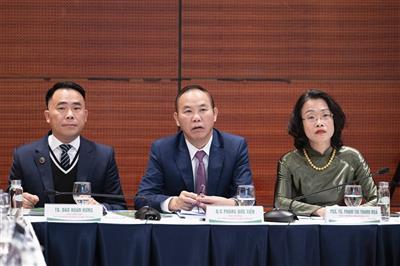
ASEAN Eco-school Award 2025: Empowering the young generation to lead the green transition
19/09/2025TN&MTEnvironmental education in schools is not simply about imparting knowledge, it is a tool to shape sustainable habits and behaviors among future generations. On September 19, in Hanoi, the Ministry of Agriculture and Environment launched the ASEAN Eco-School Award 2025 under the theme “Plastic-free schools”, accompanied by a dialogue of the same name.

Deputy Minister of Agriculture and Environment Le Cong Thanh speaks at the launching ceremony, highlighting Viet Nam’s efforts to reduce plastic waste and promote green schools with integrated environmental education, circular economy, and sustainable consumption
The event gathered nearly 300 domestic and international participants, with more than 220 online hubs connecting close to 5,800 attendees. The Award not only honors exemplary schools but also affirms the central role of students in driving the green transition. At the same time, it emphasizes the shared responsibility of schools, teachers, and communities in building clean, green, and creative learning environments—contributing to both national and regional sustainable development goals.
Plastic waste: A pressing challenge for green education
Plastic pollution has become one of the world’s most urgent environmental problems. Vietnam generates an estimated 3.8 million tonnes of plastic waste annually, yet only about 1.3 million tonnes are recycled; the rest is largely landfilled or discharged into the environment. In schools, surveys by the Ministry of Agriculture and Environment reveal that 50–60% of solid waste consists of single-use plastics. These materials are persistent in nature and risk normalizing unsustainable consumption habits among students—the citizens of the future.
This context underscores an urgent need: environmental education in schools must not stop at extracurricular activities or slogans. It must shape daily habits, from using refillable bottles instead of disposables, to waste separation at source, to energy efficiency. At the launch ceremony, Deputy Minister Le Cong Thanh underscored: “If we do not start with today’s students, it is difficult to imagine a future generation capable of fulfilling the net-zero commitment by 2050.”
This statement reflects both political determination and a fundamental principle: schools must be the cradle of the green transition, where small, everyday actions can accumulate into systemic change.
From movement to action: The ASEAN Eco-school award 2025
The theme “Plastic-free schools” was chosen not as a slogan but as a call to action. Deputy Minister Le Cong Thanh noted that students should not only save water, electricity, and separate waste, but also act as ambassadors who inspire families and communities to protect the environment.

Delegates press the button to officially launch the ASEAN Eco-School Award Viet Nam 2025
Speakers at the dialogue agreed that the Award will only have value if it is tied to concrete outcomes. Professor Emeritus Dang Thi Kim Chi, representing the judging panel, explained that evaluation would focus less on infrastructure and more on creativity and mobilization capacity: “Not every school has abundant resources, but those who act sincerely will be genuinely recognized.”
From the management perspective, Ms. Le Anh Lan, Education Specialist at UNICEF Viet Nam, stressed that leadership commitment is decisive: when school leaders consider eco-school development a core mission, implementation becomes more effective.
Architect Hoang Thuc Hao, Vice President of the Vietnam Association of Architects and designer of the Genesis School along with other globally recognized green education facilities, added: “One concrete act by teachers has far greater impact than dozens of awareness campaigns.”
Taken together, these views underline that the ASEAN Eco-School Award 2025 is more than a recognition platform. It calls for turning the green school movement into a sustainable education strategy—students at the center, teachers and administrators as guides, and communities as partners.
Students at the center of change
A distinctive feature of this year’s launch is the student-centered approach. Deputy Minister Le Cong Thanh affirmed: “Green schools cannot exist without the active participation of students. They are not just beneficiaries but the very agents of change.”
At Mac Dinh Chi High School (Hai Phong), students have been engaged from ideation to implementation. The school runs a waste separation program and organizes environmental innovation contests. Principal Nguyen Minh Quy emphasized: “We study the experiences of pioneering schools to avoid superficial movements, focusing instead on practical and sustainable activities.”

At the panel discussion, Prof. Dr. Dang Thi Kim Chi, honored for her lifelong dedication to environmental education, emphasized that after more than a decade of implementing the green–clean–beautiful school model, notable achievements have been made, yet new challenges require the development of the eco-school model in today’s context
Last year, Mac Dinh Chi students produced anti-plastic awareness videos that gained thousands of views on social media. According to Mr. Nguyen Minh Quy, expert and business support is essential to scale these initiatives beyond the classroom.
At Thong Nhat Secondary School (Hue), student engagement is even more pronounced. With WWF’s initial support, the school set up a three-bin waste separation system, launched the “Say No to single-use plastics” campaign, and organized diverse extracurricular activities, from environmental quiz shows to experiential days working with municipal sanitation workers.
The “I love the environment” club has become the creative nucleus: students developed an electronic handbook and a plastic-reduction website, earning awards at both city and national levels. This experience shows that when empowered, students can turn ideas into impactful outcomes.
In Hanoi, the Genesis education system integrates action-oriented learning with green architecture. The school runs “Energy-Saving Fridays” with nine specific actions, maintains an eco-garden, organizes second-hand fairs, and collects used batteries. Director Phan Anh announced that Genesis will publish its first Sustainability Report in the 2025–2026 academic year, a pioneering step in Viet Nam’s school sector. He noted: “Changing habits is like learning to write with the left hand: difficult at first, but perseverance makes it instinctive. Do not wait for perfection to start, begin with small steps today to move toward perfection tomorrow.”
These models from Mac Dinh Chi, Thong Nhat, and Genesis demonstrate that when students are empowered and encouraged to innovate, they can create visible change in their schools. More importantly, their initiatives extend to families and communities, gradually embedding sustainable lifestyles.
The role of families and communities
While students are central, the success of eco-schools depends on the collective engagement of teachers, parents, communities, and social organizations. Architect Hoang Thuc Hao observed: “A small, concrete act by a teacher or parent inspires students more strongly than any slogan.” Ms. Le Anh Lan emphasized that school leadership and local government commitment are decisive factors: when eco-school building is recognized as a strategic goal, it is easier to mobilize social and business support.
This synergy has enabled many schools to sustain and expand their initiatives after projects ended. WWF’s “Plastic smart schools” program supported 52 schools between 2022 and 2024, engaging more than 17,400 students and teachers. In 2025, an additional 31 schools with 18,800 students are expected to join. WWF’s educational materials and waste-sorting tools have provided schools with practical foundations.
.jpg)
Speaking at the launch, Hoang Ngoc Tuong Van, Project Manager at WWF-Viet Nam, noted that the ‘Plastic smart schools’ project engaged 17,442 students and teachers in 52 schools during 2022–2024, and will expand to 31 schools with around 18,800 students in 2025
Ms. Hoang Ngoc Tuong Van, WWF project manager in Viet Nam, highlighted: “The goal is not just reducing waste, but changing habits—starting with students and radiating to families and communities.”
Private sector and social funds are also stepping in. The Green Future Fund (Vingroup Group) pledged support along three tracks: providing resources for disadvantaged schools, offering educational materials and expert networks, and connecting with businesses to implement practical solutions. This ensures that eco-school models expand nationwide rather than remain limited to pilot sites.
From national initiative to regional commitment
The ASEAN Eco-school Award 2025 carries significance beyond national borders. It fosters regional cooperation in addressing plastic pollution and advancing sustainable development. At the launch, Deputy Minister Le Cong Thanh emphasized: “Through this initiative, Viet Nam seeks to work alongside ASEAN countries in nurturing a new generation of citizens, not only knowledgeable but also responsible and capable of leading the green transition.”
This vision has been echoed by international partners. WWF representatives welcomed the Award as a practical step by Viet Nam to help realize the global pledge to end plastic pollution by 2040. Empowering students, they noted, will equip ASEAN with a generation ready to lead the green transformation.
Above all, the initiative demonstrates that environmental education is not an auxiliary activity but a strategic pillar tied to environmental security and sustainable growth. By initiating this effort, Viet Nam has translated international commitments into concrete actions beginning in classrooms.
ASEAN Eco-School Award 2025
The ASEAN Eco-School Award 2025, organized by the Ministry of Agriculture and Environment in partnership with the Green Future Fund (Vingroup Group) and WWF, is part of the ASEAN School Network. It aims to promote green education models, reduce plastic waste, and advance the region’s sustainable development agenda. The theme for this year is “Plastic-Free Schools.”
The competition runs from September 2025 through the 2025–2026 academic year, open to all general education institutions nationwide. Schools must design and implement action plans to create clean, green, and creative learning environments. Applications and final reports are due by the third quarter of 2026, followed by national evaluation and award announcements.
Entries will be judged on four criteria: sustainability of the model, creativity in design and implementation, active student participation, and potential for community replication. Winning schools will represent Viet Nam in the ASEAN-level competition.
Awards include First, Second, and Third Prizes, as well as special prizes for outstanding initiatives. Beyond financial and material support, the greatest reward lies in recognition: the opportunity for schools to position themselves as pioneers in environmental education, while enabling Vietnamese students to share experiences with peers across ASEAN.
Minh Thao




